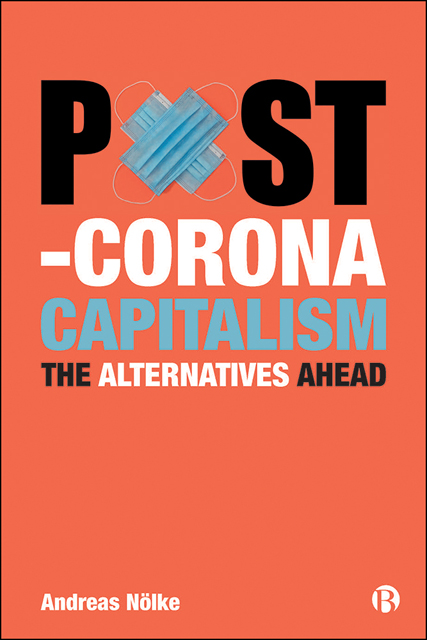Book contents
- Frontmatter
- Dedication
- Contents
- List of Abbreviations
- Acknowledgements
- Preface
- 1 Introduction: Confronting a Multidimensional Crisis of Capitalism
- Part I Capitalism and Society
- Part II Domestic Institutions of Capitalism on the Demand Side
- Part III Domestic Institutions of Capitalism on the Supply Side
- Part IV The International Institutions of Capitalism
- Part V Anthropocene Capitalism
- Part VI Geo-economic Shifts in Global Capitalism
- Part VII Ideologies in Contemporary Capitalism
- References
- Index
24 - Climate Change: Cheap Dirty Energy or Green New Deal?
Published online by Cambridge University Press: 13 October 2022
- Frontmatter
- Dedication
- Contents
- List of Abbreviations
- Acknowledgements
- Preface
- 1 Introduction: Confronting a Multidimensional Crisis of Capitalism
- Part I Capitalism and Society
- Part II Domestic Institutions of Capitalism on the Demand Side
- Part III Domestic Institutions of Capitalism on the Supply Side
- Part IV The International Institutions of Capitalism
- Part V Anthropocene Capitalism
- Part VI Geo-economic Shifts in Global Capitalism
- Part VII Ideologies in Contemporary Capitalism
- References
- Index
Summary
During the coronavirus crisis, the use of disposable gloves and plastic containers for goods surged. In the mindset of many people, the war on the environment took the backseat for a while. But will it return to the front seat in the era of post-corona capitalism? Among environmental activists, the coronavirus crisis gave rise to hope, that this crisis is an ‘opportunity’, a trigger, for change. But will it be a change in the ‘right’ direction? Work on global environmental change in International Political Economy helps us to answer these questions in an informed and structured manner (for discussions in Environmental Studies with relevance for Political Economy, see Chapter 25).
International Political Economy and climate change
In contrast to other issue areas in International Political Economy such as trade and finance, the epistemic authority of scientists is particularly relevant with regard to climate change. It took not only this authority to get the topic of climate change onto the international agenda at all, but this authority became to a surprising degree contested. The questions whether climate change exists, whether it is dangerous and whether it is man-made still are contested by sizeable minorities, in spite of the overwhelming scientific evidence that answers these questions affirmatively (O’Brien and Williams, 2016: 250–1, 256). As we shall see, this problem returned during the coronavirus pandemic. When people agree on the highly dangerous and man-made nature of climate change, this leads to the question where it exactly it is coming from. From an International Political Economy perspective, the role of economic globalization for the causation of climate change is particularly relevant (Dauvergne, 2020: 386–9). How did the temporary retreat of globalization during the pandemic affect climate change?
After clarifying what causes climate change, the question is what we can do about it. This has been the focus on decades of international negotiations about agreements to limit climate change. From an International Political Economy view, a core question in order to discuss the likelihood of successful agreements is the political power of business vis-a-vis other social forces (O’Brien and Williams, 2016: 256–8; Dauvergne, 2020: 389–94, 400–10). How does the coronavirus pandemic affect the balance of forces in these negotiations?
- Type
- Chapter
- Information
- Post-Corona CapitalismThe Alternatives Ahead, pp. 151 - 155Publisher: Bristol University PressPrint publication year: 2022



